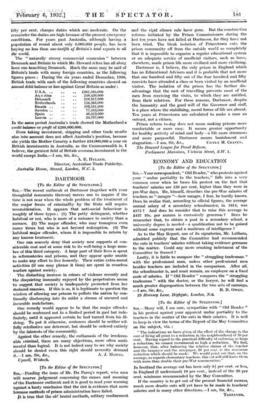• DARTMOOR [To the Editor of the Sracrsrmi..]
Szit,—The recent outbreak at Dartmoor (together with your thoughtful comments thereon) moves one to inquire if the time is not near when the whole problem of the treatment of the major fornis of criminality by the State will require 'reconsideration. It appears that anti-social behaviour is roughly of three types : (1) The petty delinquent, whether habitual or not, who is more of a nuisance to society than a menace. (2) The major offender, who May transgress even Many times but who is not beyond redemption. (8) The habitind major offender, whom it is impossible to reform by any known treatment.
One am scarcely deny that society now supports at con- siderable cost and at some risk to its well-being a large num- ber of this third category. A large part of their lives is spent in reformatories and prisons, and they appear quite unable to make any effort to live honestly. Their entire extra-mural activities (if one may phrase it thus) are spent in ceaseless warfare against society.
' The disturbing increase in crimes of violence recently and the disquieting immunity enjoyed by the perpetrators seems to suggest that society is inadequately protected from her declared enemies. If this is so, it is legitimate to question the wisdom of allowing our prisons to pollute the nation by con- tinually discharging into its midst a stream of uncured and
incurable malefactors.
One remedy would appear to be that the major offender should be sentenced not to a limited period in gaol but inde- finitely, until it appeared certain he had turned from his ill. doing. To put it otherwise, sentences should he neither wil- fully retributive nor deterrent, but should be ordered entirely by the interests of the community.
Against the other remedy, the euthanasia of the irredeem. able criminal, there are many objections, more often senti- mental than logical. It is not indeed easy to see why society should be denied even this right should necessity demand








































 Previous page
Previous page